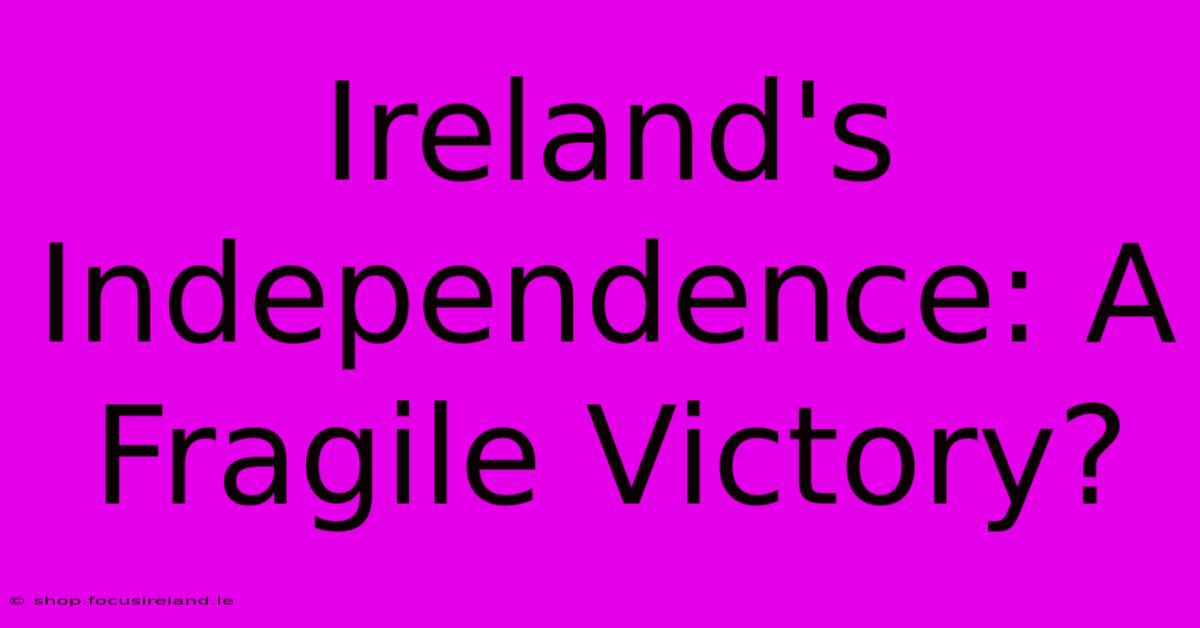Ireland's Independence: A Fragile Victory?

Table of Contents
Ireland's Independence: A Fragile Victory?
The Easter Rising of 1916, a bold but ultimately unsuccessful rebellion against British rule, is often considered the pivotal moment in Ireland's struggle for independence. While the Rising itself was swiftly suppressed, its impact resonated deeply, igniting a surge of Irish nationalism that ultimately led to the establishment of the Irish Free State in 1922. But was this independence a true victory, or a fragile achievement, burdened by internal divisions and unresolved issues? This article explores the complexities of Ireland's hard-won freedom.
The Seeds of Discontent: Pre-1916 Ireland
For centuries, Ireland endured oppressive British rule, characterized by land confiscations, religious persecution, and economic exploitation. The "Great Famine" of the 1840s, which resulted in the deaths of over a million people, further fueled resentment and anti-British sentiment. Various nationalist movements emerged throughout the 19th century, advocating for everything from home rule to complete independence. The failure of these earlier movements, coupled with the brutal realities of British rule, set the stage for the more radical approach of the Easter Rising.
The Easter Rising: A Catalyst for Change
The Easter Rising, though militarily unsuccessful, proved to be a powerful propaganda coup for the Irish nationalists. The execution of its leaders, including Patrick Pearse, James Connolly, and Roger Casement, transformed them into martyrs in the eyes of many Irish people. The Rising's brutality at the hands of the British army galvanized public opinion and significantly boosted support for the independence movement. The war's conclusion and the weakening of Britain after four years of conflict also significantly helped Irish nationalist cause.
The Anglo-Irish Treaty: A Compromise and its Consequences
The War of Independence (1919-1921), a brutal guerrilla war fought between the Irish Republican Army (IRA) and British forces, culminated in the Anglo-Irish Treaty of 1921. This treaty established the Irish Free State, granting dominion status within the British Commonwealth. Crucially, however, it partitioned Ireland, leaving six counties in the north (Northern Ireland) under British rule. This partition remains a highly contentious issue to this day.
The Civil War: Brothers Against Brothers
The Treaty's ratification triggered a bitter civil war between pro-treaty and anti-treaty factions within the IRA. The pro-treaty side, led by figures like Michael Collins, argued that the treaty represented a significant step towards full independence and a necessary compromise given the circumstances. The anti-treaty side, led by Éamon de Valera, rejected the treaty, viewing it as a betrayal of the republican ideal of a unified, independent Ireland. This devastating conflict further fractured Irish society and left a legacy of deep-seated resentment.
The Legacy of a Fragile Victory
Ireland's independence was undoubtedly a hard-fought victory, but it was achieved at a significant cost. The partition of Ireland, the bitter civil war, and the unresolved issues surrounding Northern Ireland all contribute to the sense of fragility that accompanied the newly formed Irish Free State. The legacy of the struggle for independence continues to shape Irish politics and society today, highlighting the enduring complexities of achieving and maintaining national identity and sovereignty.
The Ongoing Struggle: Northern Ireland and Beyond
The question of Northern Ireland remains a central challenge to the notion of a fully realized Irish independence. The ongoing conflict known as "The Troubles" further underscores the fragility of the peace achieved in 1922. The Good Friday Agreement of 1998 brought a significant step forward, but the complexities of reconciling deeply held identities and aspirations remain. Understanding Ireland's path to independence requires acknowledging both the triumphs and the enduring challenges that continue to shape the nation's identity.
In Conclusion: While the establishment of the Irish Free State marked a significant turning point, labeling Ireland's independence a purely "fragile victory" is an oversimplification. It was a complex achievement, laden with compromise, conflict, and unresolved issues that continue to impact the nation today. Its legacy is one of both triumph and ongoing struggle, a testament to the enduring pursuit of self-determination and the enduring cost of freedom.

Thank you for visiting our website wich cover about Ireland's Independence: A Fragile Victory?. We hope the information provided has been useful to you. Feel free to contact us if you have any questions or need further assistance. See you next time and dont miss to bookmark.
Featured Posts
-
Thriving On A Budget In Limerick Ireland
Mar 30, 2025
-
Prime Minister Of Ireland Crossword Quick Answers Here
Mar 30, 2025
-
30 Days Of Dublin Weather Predictions Revealed
Mar 30, 2025
-
Trusted Breeders Quality Dogs For Sale In Ni
Mar 30, 2025
-
Unplug And Unwind Find Your Peaceful Mayo Cottage
Mar 30, 2025
